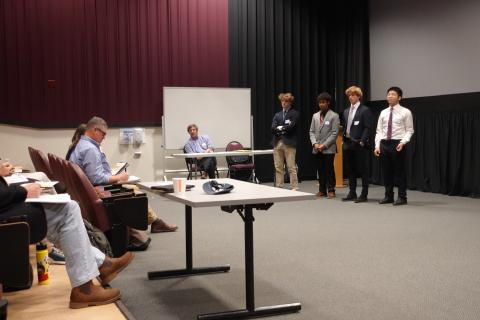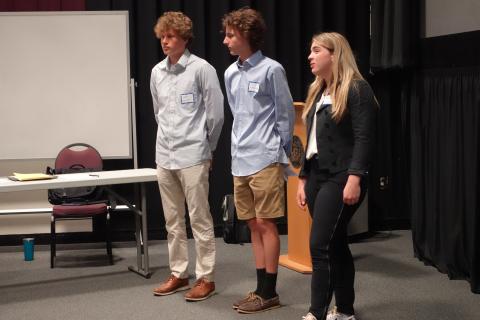Brent Powell serves as Director of School Partnerships for the Community Changemaker Challenge and is in the process of founding a new educational nonprofit to help expand the CCC and bring Design Challenge Learning to even more schools. He can be reached at brentnall.powell@unh.edu.

The UNH Changemaker Collaborative's (a partnership of the Sustainability Institute, Peter T. Paul College of Business and Economics and the Carsey School of Public Policy) sixth annual UNH Community Changemaker Challenge (CCC) took place for New England high school students on May 12. An outgrowth of the popular UNH idea-stage competition the Social Venture Innovation Challenge (SVIC), this year’s CCC featured the greatest number of schools, teams, and students that we have ever hosted.
As with the SVIC, students are charged with the task – identify a sustainability problem (defined broadly and using the UN 17 Sustainable Development Goals as a suggested framework) in your community, region, or somewhere else in the world, and use an innovative and entrepreneurial approach to develop an idea to address it. What the students produce amazes and inspires.
This year, students from six schools – Berwick Academy, Governor’s Academy, Phillips Exeter Academy, Second Nature Academy, Oyster River High School, and Portsmouth High School – sent a total of fourteen teams, comprising 45 students to the competition. Students addressed problems ranging from homelessness to climate change, safety for the elderly to harm resulting from sunscreen. They arrived with well-rehearsed pitches, prototypes, and creative videos to express their ideas in front of a panel of judges.

Fiona Wilson, Deputy Chief Sustainability Officer for UNH and the Director of the UNH Sustainability Institute, opened the event by putting the CCC into the larger context of UNH and by saying, “this program that engages and supports high school students across our region is just one of the ways that we are fulfilling our educational mission and aspiration to support the development of a half a million changemakers in the coming decade.”
With fourteen different entries, the students were divided across two rooms. Once their videos were shown and a short pitch was given, each team faced ten minutes of questions from the judges. These questions focused on the origins of the innovation, what else exists in the marketplace that attempts to solve the problem, what kind of research was done, and how might the finances work? After the event, judges shared similar comments as in years past, praising the students for the “sensitivity, compassion, and intelligence their projects displayed.” One judge even said that she hoped to bring the new infusion of energy she was feeling back to her team at work.
Students too enjoyed the day, and when asked: “What have you learned/gained through competing in the Community Changemaker Challenge?”, here is what a few of them said:
- “The importance of research, collaboration as a team, and the need to reach out to people who can help with a venture and those who hopefully would benefit.”
- “Creativity is key”
- “How to work with others and how to develop an idea into a legitimate opportunity”
- “I have learned there are many problems happening in the world and we humans have to step up and find the best solution.”
- “Seeing others’ projects inspires me in my own projects, it makes me less afraid to present an idea.”
After almost an hour of deliberation, the judges emerged with results. We hope you’ll take the time to view the student videos which show the collaboration and creative problem-solving the CCC inspires in our local high school students.

Winners:
BIOThermal (Second Nature Academy)
An innovative way to generate renewable energy using organic matter. View the video.
Guardian Angel (Governor’s Academy)
A health detection device that can automatically call 911 for help when needed, trying to make seniors live a safer and more secure life. View the video.
Runners-Up:
EduRoad (Phillips Exeter Academy)
A center for resources that all people, no matter what their socioeconomic status, can access and receive personalized help. View the video.
Engineering through the Ethics of Care (Oyster River High School)
A curriculum that teaches high school students engineering through the framework of Ethics of Care to increase empathy and diversity in engineering. View the video.
